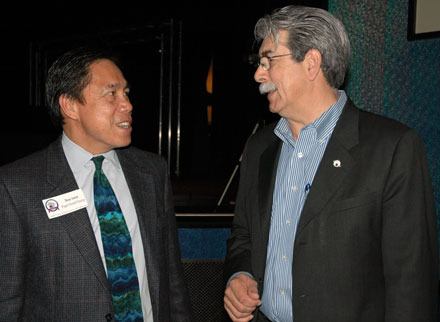TULALIP — The State of the Tulalip Tribes was the subject of the April 30 Business Before Hours meeting at the Tulalip Resort.
Speaking before fellow members of the Greater Marysville Tulalip Chamber of Commerce, Tulalip Tribal Chair Mel Sheldon Jr. described a community that’s tightened its collective belt recently, but is still optimistic about its future.
“We have more college graduates than ever before,” Sheldon said. “Marjorie James is in her first year of law at Harvard.”
Sheldon estimated that, of the Tulalip Tribes’ population of approximately 4,000, close to half are 18 years or younger. He noted that the Tribes directly employ approximately 3,500 “team members,” and indirectly provide employment for more than 500 more through the Quil Ceda Village. He added that the Tribes pay an estimated $120 million in wages annually.
“Through our gaming, we invest in education, housing, and health and human services,” Sheldon said. “We invest in our people, whether it’s orthodontics or tutoring for our children, or even just wood for our elders’ fires. We’ve provided 60 new homes for our people this past year.”
Sheldon explained that the Tribes are on track to stay within their revenue projections for 2010, although he pointed out, “Those were conservative numbers.” He acknowledged that the Tribes are not immune from the ongoing recession, but he described the Tribes’ gaming operations as going through “not the same degree of downturn” as other gaming operations. He credited Ken Kettler, president of the Tulalip Resort Casino, with helping to sustain this relative success.
Sheldon was also quick to praise recently retired city of Marysville Chief Administrative Office Mary Swenson and Mayor Dennis Kendall for helping foster a mutually beneficial relationship between the city and the Tribes. He also singled out Tulalip General Manager Shelly Lacy for her contributions to the Tribes’ accomplishments.
Looking back over the past year, Sheldon cited the importance of the Tulalip administration building in creating a more centralized system of government for the Tribes, to serve its peoples more efficiently. Looking ahead, he sees tough times testing the Tribes, but believes that they’ll be able to secure state and federal funds to team up with the city of Everett in installing a nine-mile water pipeline, projected to pump 36 million gallons a day.
Sheldon also expressed enthusiasm for the opening of the Tulalip Cultural Museum within the coming year.
“The museum will be a way for us to tell our stories, and to share them with the community at large,” Sheldon said.
When asked what he saw as one of the keys for the Tribes to survive the current economic downturn, Sheldon said, “It boils down to communication. This is serious business, so our Tribal members need to remember that we are in a recession. If they think everything is beautiful, they’ll just, ‘Where’s our per capita?’ We share these facts with our membership, and we believe that we’ll come out the other side of this thing stronger.”



